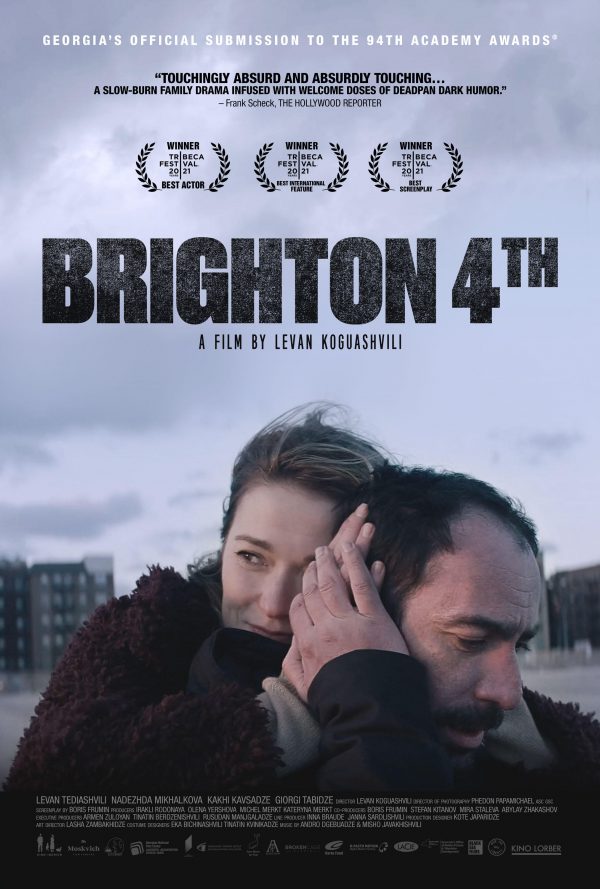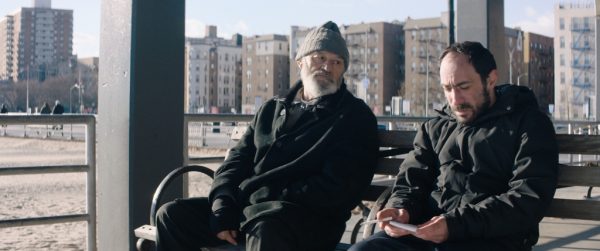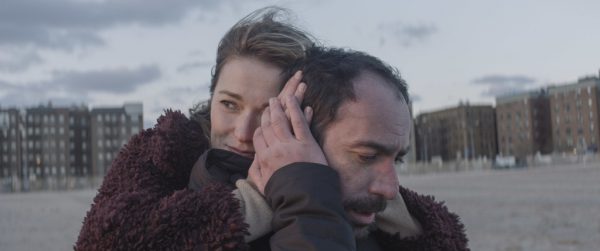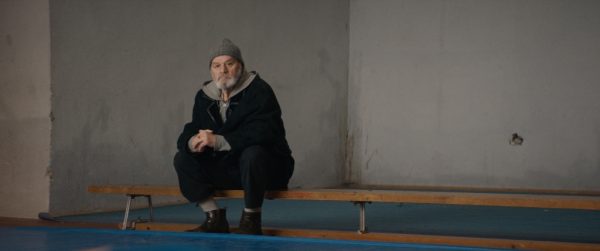‘Brighton 4th’ celebrates love, compassion, selflessness

“Brighton 4th” (2021 production, 2022 release). Cast: Levan Tedaishvili, Giorgi Tabidze, Nadezhda Mikhalkova, Kakhi Kavsadze, Laura Rekhviashvili, Tsutsa Kapanadze, Temur Gvalia, Tolepbergen Baisakalov, Irma Gachechiladze, Mary Caputo, Lew Gardner, Yuri Zur. Director: Levan Koguashvili. Screenplay: Boris Frumin. Web site. Trailer.
How far can one’s sense of compassion and helpfulness extend? In an age of rampant self-absorption, that’s a good question. So many individuals today are preoccupied with their own needs, wants and whims that they may be wholly dismissive of such commendable qualities. At the same time, though, there are also remarkably sympathetic souls who will readily go to the wall for others, gestures that those who are less considerate may look upon as strange or even unfathomable. Thankfully, however, those admirable kindhearted oddballs are still around, as seen in the charming new comedy-drama/character study, “Brighton 4th.”
Kakhi (Levan Tedaishvili), an aging onetime Georgian wrestling champ, never seems to stop quietly caring about others. He lives a modestly comfortable life in Tbilisi with his wife, Maka (Laura Rekhviashvili), who spends much of her time bedridden (and who Kakhi lovingly attends to). But she’s not the only one he cares for. As best he can, he also tries to help out his brother (Temur Gvalia), who has a gambling problem, often frittering away hard-earned funds intended for more important purposes. But the one he’s most concerned about is his son, Soso (Giorgi Tabidze), who has relocated to New York – and whom Kakhi hasn’t heard much out of for some time.
Concerned and curious about what’s going on with Soso, Kakhi decides to visit him. Soso’s purpose in moving to New York was to study medicine and become an American doctor. However, when Kakhi arrives, he finds the situation is not what he believed it to be. Soso lives in a shabby boarding house run by Kakhi’s sister-in-law, Natela (Tsutsa Kapanadze), in Brooklyn’s Brighton Beach neighborhood, home to many émigrés from Russia and other former Soviet states. Instead of studying for exams, Soso works for a moving company, trying to earn enough money to pay off a $14,000 gambling debt owed to Amir (Yuri Zur), a local mafioso. He’s also attempting to raise cash to bankroll a green card wedding to Lena (Nadezhda Mikhalkova), a Georgian immigrant who’s become a naturalized citizen, so that he can legally stay in the US. But, despite his efforts at getting back on his feet, Soso keeps digging a deeper hole for himself due to his uncontrolled appetite for playing cards (and not very well).
Needless to say, Kakhi is quietly disappointed by what he sees. However, as the loving father he is, he wants to help his son turn things around. What’s more, as the newest resident of Brighton Beach, he’s eager to help the cadre of other colorful Georgian immigrants who live in his boarding house and the surrounding neighborhood, doing whatever he can to be of service. For example, he freely comes to the aid of Nana (Irma Gachechiladze), a cleaning woman who hasn’t been paid in months by her Kazakh hotelier boss, Farik (Tolepbergen Baisakalov), an encounter in which Kakhi’s muscular prowess as a former wrestler proves quite useful. He’s also willing to get creative in the measures he employs to be of help, as seen in a hilariously unconventional confrontation with Amir.

Through it all, Kakhi is a good friend to everyone he meets, doling out wise advice to those in need of it, such as Lena and Sergo (Kakhi Kavsadze), an elderly singing maître-d who lives in the boarding house. In line with this, he does whatever he can to ease the pain of others, as seen in conversations with Maka and Natela in which he smilingly assures them that all is well with their loved ones. His tactics may involve stretching the truth a little (or even a lot), but his concern for sparing others’ feelings is paramount with him. He’s also quick to forgive, especially when he can tell that others are sincere in their desire for atonement, engaging in acts of compassion and tolerance toward them that most of his cohorts are not so willing to dispense.
At the same time, Kakhi is nobody’s fool, either, and he’s not inclined to indulge those who take advantage of his kindness and good graces. This becomes apparent when Natela secures a job for him as a caretaker for an elderly couple, Tsilya (Mary Caputo) and Simon (Lew Gardner). Kakhi accepts the position in good faith, but he soon sours on it when Tsilya shamelessly comes onto him, often in front of Simon, acts that bewilder her husband and offend her new caregiver. Needless to say, the job doesn’t last long.
Such selflessness is indeed admirable, but, then, that’s who Kakhi is. But, given the magnitude of what he takes on, can he realistically work miracles every time? That’s what gets put to the test in this odyssey in New York. Indeed, Kakhi is used to “wrestling” with challenging circumstances; it’s something he’s done all his life, in various forms and generally quite successfully. But can he make it happen again?

The world could use more souls like Kakhi, especially these days. The acts of individuals like him are truly laudable. What’s perhaps most impressive, however, is how naturally these gestures seem to come to them. They step in without question, providing compassionate assistance when needed, with nothing expected in return. They genuinely embody the notion of the Samaritan whenever honest, honorable help is required. That’s the key in understanding them, for this is what constitutes their true selves. And, as their true selves, this is what enables them to carry out their deeds so successfully. They sincerely believe in what they’re doing, a point crucial to the unfolding of their existence, for their thoughts, beliefs and intents shape their reality. This is a result of the conscious creation process, the philosophy that maintains we tap into these resources in the creation of the world we experience.
Being true to ourselves is integral to manifesting the reality we desire. By drawing upon belief reserves driven by our honesty and integrity, we come closer to achieving our aspirations, and that’s especially true – and beneficial – in matters of compassion. It enables us to be the individuals we truly want to be, and it shows in the results, as it very much does with Kakhi.
In many instances, pulling off such acts of selflessness requires us to be both courageous and creative, qualities readily apparent in how Kakhi operates. As he tackles the challenges before him, he never shies away from them. And, if he needs to take an unconventional approach to how he proceeds, he’ll avail himself of the creativity required to make it happen. His use of these attributes in his various ventures thus provides us with examples of how to proceed in our own undertakings as the need for them arises.
In Kakhi’s case, his actions and their underlying beliefs illustrate what it means to be devoted to those we care about, our family and friends. As our companions on this journey we call life, they’re the ones who matter the most to us, and it’s best to demonstrate that in our acts and deeds. Kakhi understands this and thus knows what it takes to make life truly fulfilling. We should all follow his lead to make our – and their – existence more rewarding, even when circumstances take a downward turn. Life can indeed be redeeming, even if we’re not the ones to bring it about on our own, so it’s at times like these when we can be thankful for the Kakhis in our lives.

That’s what director Levan Koguashvili’s third narrative feature explores in this heart-tugging comedy-drama/character study. The film’s carefully crafted portrait of its Samaritan protagonist shows how it’s possible to help make things right for others, no matter what it takes, including the employment of everything from “polite” physical intimidation to telling “good lies” to assuage tender feelings. The result is a touching tale that stirs an array of viewer emotions, feelings brought out by the fine performance of Levan Tedaishvili, himself a former Olympic wrestling champion turned actor appearing here in only his second screen role. While the narrative tends to meander somewhat at times, the pieces that make up this story nevertheless collectively depict a close-knit community, with Kakhi at the center, made up of individuals who support one another through thick and thin and still rely on such traditional conventions as good faith and personal honor, even in dealings of a shady nature. We can learn a lot from that in a day and age when such values have come to be seen as outmoded and sentimentally quaint, a lesson that can help us wrestle with life’s challenges while maintaining an honorable sense of dignity and decency.
“Brighton 4th” has primarily been playing the film festival circuit, though it is now available for streaming online. Along the way, the picture has been well received by critics and viewers, especially in New York, the setting of the story. At the Tribeca Film Festival, this offering came up a trifecta winner in the international narrative feature competition, capturing the event’s awards for best picture, actor (Tedaishvili) and screenplay. That’s quite an accomplishment for a film that was cast with mostly inexperienced and nonprofessional actors, a true testament to the strength of this release.
We can all use a little help from time to time, and we should be thankful when individuals like Kakhi cross our paths. His kind of help exemplifies the altruistic principles depicted in films like “Pay It Forward” (2000), wherein assistance flows freely from us, with no expectations in return (even though the good feelings that come back to us often provide us with sufficient reward in their own right). It makes life in places like Tbilisi and Brighton Beach that much more manageable, especially under the challenging conditions their inhabitants must often endure. And that, in itself, can make life more worth living.
Copyright © 2022, by Brent Marchant. All rights reserved.



